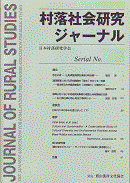Volume 24, Issue 2
Displaying 1-8 of 8 articles from this issue
- |<
- <
- 1
- >
- >|
-
2018Volume 24Issue 2 Pages 1-13
Published: April 25, 2018
Released on J-STAGE: May 31, 2019
Download PDF (1385K) -
Article type: research-article
2018Volume 24Issue 2 Pages 14-25
Published: April 25, 2018
Released on J-STAGE: May 31, 2019
Download PDF (1528K) -
Article type: research-article
2018Volume 24Issue 2 Pages 26-37
Published: April 25, 2018
Released on J-STAGE: May 31, 2019
Download PDF (3419K)
-
Article type: book-review
2018Volume 24Issue 2 Pages 40-41
Published: April 25, 2018
Released on J-STAGE: May 31, 2019
Download PDF (635K) -
Article type: book-review
2018Volume 24Issue 2 Pages 42-43
Published: April 25, 2018
Released on J-STAGE: May 31, 2019
Download PDF (3076K) -
Article type: book-review
2018Volume 24Issue 2 Pages 44-45
Published: April 25, 2018
Released on J-STAGE: May 31, 2019
Download PDF (635K) -
Article type: book-review
2018Volume 24Issue 2 Pages 46-47
Published: April 25, 2018
Released on J-STAGE: May 31, 2019
Download PDF (668K) -
2018Volume 24Issue 2 Pages 48-49
Published: April 25, 2018
Released on J-STAGE: May 31, 2019
Download PDF (654K)
- |<
- <
- 1
- >
- >|
